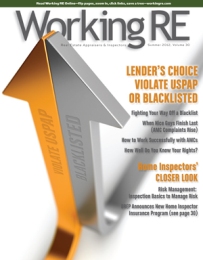
|
Home Inspectors Edition | Circulation 22,000 | Advertise | Subscribe | |
Published by OREP, E&O Insurance Experts | August 2012 |

|
|
A manufactured home is
constructed in the factory to the national HUD building code and remains a
manufactured home forever regardless of how it is installed, what type of
foundation and skirting it has or anything else that is done to it.
Editor's Note: Distinguishing between a manufactured and modular home is vital to your work but sometimes not so easy to do. An appraiser-expert in these housing types clears up the confusion on how to tell them apart.
Manufactured or Modular Home?
By Jo Ann Meyer Stratton, IFA, SRA
Many appraisers and home inspectors have a hard time distinguishing
manufactured from modular homes- and the differences can be critical. Here's
what you need to know.
A manufactured home is
constructed in the factory to the national HUD building code and remains a
manufactured home forever regardless of how it is installed, what type of
foundation and skirting it has or anything else that is done to
it. Classification by the local assessing/tax office or other governing
agency doesn't change a home constructed to the HUD building code either.
Typically a manufactured home has a metal frame/chassis/undercarriage that
provides structural support for the home after installation. There were a
few constructed in the early 1980s that did not have an undercarriage but
are still manufactured homes because they were constructed to the HUD
building code.
A modular home is
constructed in the factory to whatever local building code is applicable for
the location it will be installed. An "off frame” chassis/undercarriage
modular home does not have any metal structure to support the home. While
under construction in the factory, a steel frame is used as a work table and
used to transport the home from the factory to the site, where the home is
picked up with a crane and put in place on a prepared foundation. The frame
then goes back to the factory for construction of the next "off
frame" modular.
An “on frame”
chassis/undercarriage modular home has a permanent steel
undercarriage/frame/chassis that provides the structural support after the
home is installed on site.
If it is an “on frame” modular, it will not be eligible for a Fannie Mae loan because of some quirks in their guidelines. Fannie Mae classifies anything with a steel undercarriage as a manufactured home--which would include mobile homes constructed prior to June 15, 1976, manufactured homes constructed after that date and “on frame” modular homes. The eligibility section of their guidelines state that to be eligible for the mortgage to be purchased by Fannie Mae, the manufactured home has to be constructed to the HUD building code--which eliminates mobile homes and “on frame” modular homes. If you are appraising an “on frame” modular home, be sure and have the information in the report that it will not be eligible for Fannie Mae. It is eligible for Freddie Mac, FHA and VA. Of course, with the proposed changes at Fannie Mae and Freddie Mac, future regulations are uncertain.
(story continues below)

(story continues)
Regardless of what type of factory built home you are appraising or inspecting (or selling), take photos and make notes of all insignias, labels, tags, data plates, etc. that you find on the exterior and in the interior of the home. Include those photos and information in the report. Appraisers research the tax situation, report what you find and if the factory built home is not currently taxed as real property, explain what needs to be done prior to close of escrow for it to be taxed in the future as real property.
Remember too that the
original building code from the factory while the home was under
construction has to be verified prior to completing the appraisal
assignment. The original building code is the only answer to whether a home
is a manufactured home or a modular home. Occasionally in some
factories, manufactured homes, on frame modular homes and off frame modular
homes are all constructed in the same factory, on the same assembly
line, with the same floor plan, materials, options, amenities. Once the
construction is complete, someone looking at the homes can not tell which
home was constructed to which building code.
While they were under construction it was constantly being inspected by a
state or private inspection agency for compliance to a specific code. When
construction is complete, the inspector will apply HUD labels on the
exterior and data plates in the interior for the ones constructed to the HUD
building code. If the home was constructed to a local site built building
code like International Residential Code, Uniform Building Code, Building
Officials and Code Administrators, or other similar codes, the state or
inspection agency tags/label indicating compliance with that code will be
affixed to the home somewhere on the exterior or in the interior or on a
framing member in the roofing assembly. Those labels/tags/insignias are the
only way to verify the original building code.
ATTENTION: You are receiving WRE Online News because you opted in at WorkingRE.com or purchased E&O insurance from OREP. WRE Online News Edition provides news-oriented content twice a month. The content for WRE Special Offer Editions is provided by paid sponsors. If you no longer wish to receive these emails from Working RE, please use the link found at the bottom of this newsletter to be removed from our mailing list.



